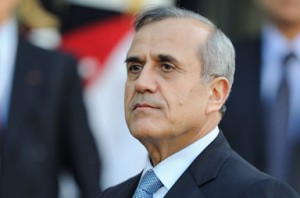 President Michel Suleiman praised on Tuesday the efforts of the Lebanese army in containing the clashes in the southern city of Sidon.
President Michel Suleiman praised on Tuesday the efforts of the Lebanese army in containing the clashes in the southern city of Sidon.
“The calls for the soldiers to defect and others to wage jihad against the army were pointless and didn’t achieve their desired results, ” a statment from the presidential palace said adding :”The army was granted political cover as soon as the clashes broke out”.
“The army has soldiers that are willing to make sacrifices regardless of how great they may be,” stressed the statement
“Lebanon is strong because it enjoys a brave military leadership that commits to political decisions,” the statement added
Suleiman offered his condolences to the families of the victims of the Sidon clashes, expressing his support to Army Commander General Jean Kahwaji.
At least 16 soldiers were killed and 50 were wounded in two days of clashes with the armed supporters of Salafist cleric Sheikh Ahmed al-Assir in Sidon.
More than 20 of Asir’s supporters were killed, according to a security official.
Dozens of them were also arrested.
Assir, known for his tirades against Iran-backed Hezbollah’s influence over the Lebanese state and army, posted a video online Sunday calling for Sunni soldiers to defect from the army, which he lambasted as “Iranian and Shiite”.
“To all our partisans, we are being attacked by the Lebanese Army, which is Iranian and Shiite,” Assir said in the video. He claimed the Army belonged to the “shabiha [thugs]” of Hezbollah leader Hassan Nasrallah and his ally, Parliament Speaker Nabih Berri, who heads the Amal Movement.
There were conflicting reports about the whereabouts of Assir. Some reports claimed he fled to Syria , but they were later denied by the Free Syrian Army , other reports indicated he fled to the nearby Ain El Helweh Palestinian Refugee camp.
Hezbollah blamed
Commenting on the clashes in the southern city of Sidon, Lebanese Forces leader Samir Geagea said in an interview with Free Lebanon radio station on Monday that the “phenomenon” of Sunni cleric Ahmad al-Assir was a reaction to Hezbollah’s activities in Lebanon, calling on all Lebanese to support the army and the state.
“The phenomenon of Hezbollah produced several other phenomenons, including that of Assir.” It is not about [the proliferation of] weapons, but rather mini-states leading to more mini-states,” Geagea said.
“Assir is a big problem, but Hezbollah is the one that is taking [Lebanon] as hostage.” Geagea stressed.
“We are all citizens who enjoy the same rights and duties, but when one citizen sees that another enjoys superiority over him regarding these rights, then he is bound to react against this reality,” he said in reference to Hezbollah.
“Hezbollah has violated all laws and state institutions seeing as it revolts against any political issue that it opposes, which was demonstrated during the May 7, 2008, clashes,” Geagea said
“We believe that the army’s tackling of the situation in Sidon marks the beginning of addressing the possession of illegitimate arms and the presence of ‘statelets’ in Lebanon,” he added.
“When a portion of Lebanese believe that they have the right to form an armed group independent of the state, then other Lebanese will follow suit,” he stressed.
“This is the mistake that Assir committed and the only way to end this reality lies in resorting to state institutions, starting with the army,” he said.
“We can no longer tolerate illegitimate arms, whether they are in Assir’s possession or Hezbollah’s,” he said.
Geagea added that the demand to eliminate Assir’s phenomenon should go a step further to include the arrest of those who killed Hashem Salman in front of the Iranian Embassy in Beirut on June 9.
“Tackling one phenomenon and not the other will not end the current situation in Lebanon, because similar armed groups will emerge in the country in the future,” he explained.
“The biggest problem lies in the presence of Hezbollah because failure to tackle this problem will create future ones and we will continue to move from one bad situation to a worse one,” said the LF leader.
“From now on, we will demand that the state perform its duties until the end, which goes beyond ending the unrest in Sidon,” he stressed.
“Where are Salman’s murderers?” Geagea wondered.
Salman, 28, the leader of the student section of the Lebanese Option party , was killed and several other anti-Hezbollah protesters were wounded in the June 9 demonstration, outside the Iranian Embassy in Beirut.
Earlier in the week the leader of the Lebanese Option party Ahmad al-Asaad blamed Hezbollah leader Hassan Nasrallah and senior officials in the Lebanese state for Salman’s killing .

Leave a Reply
You must be logged in to post a comment.